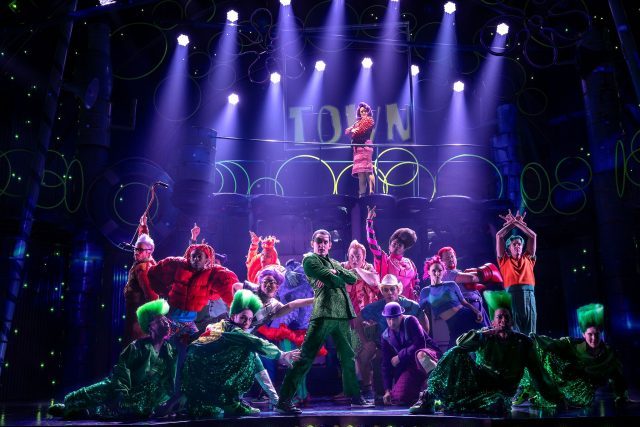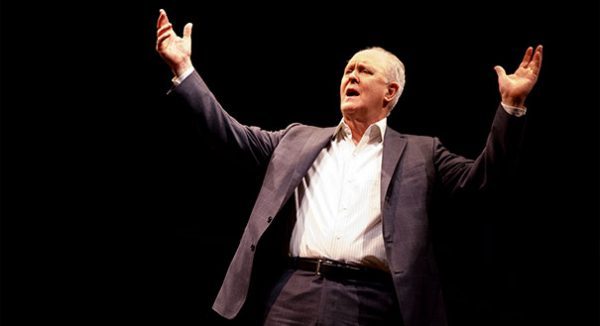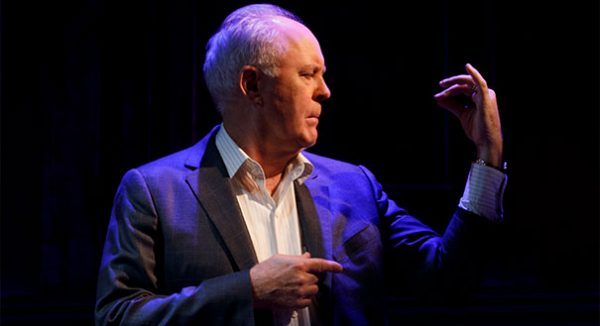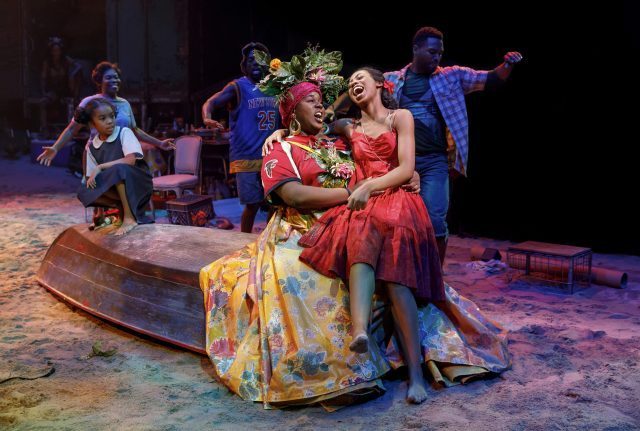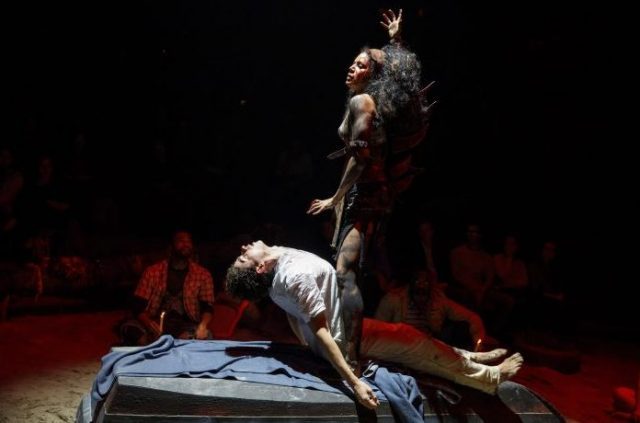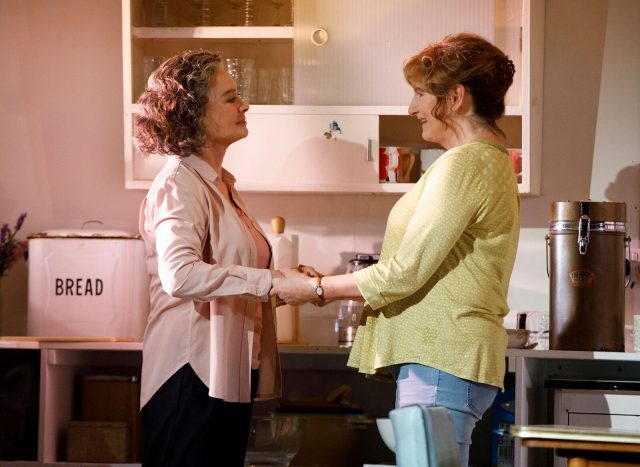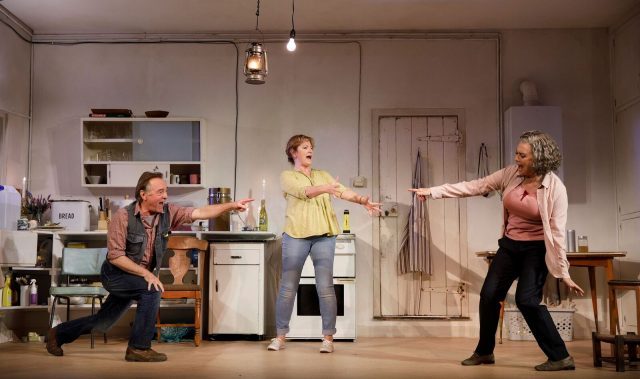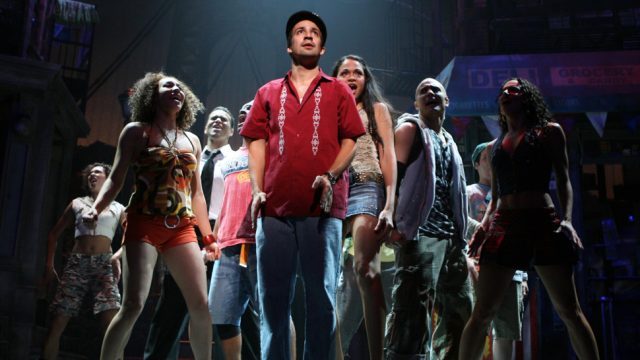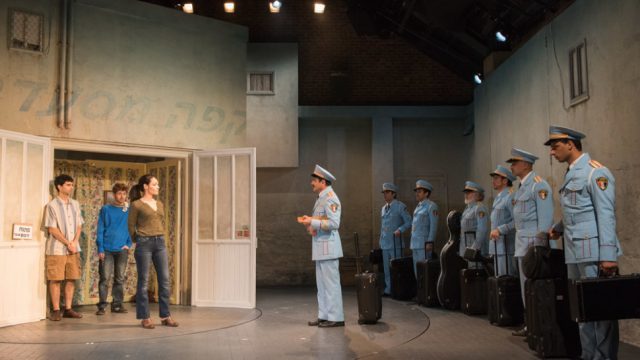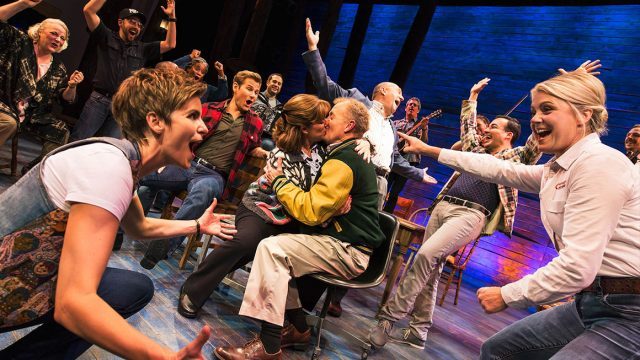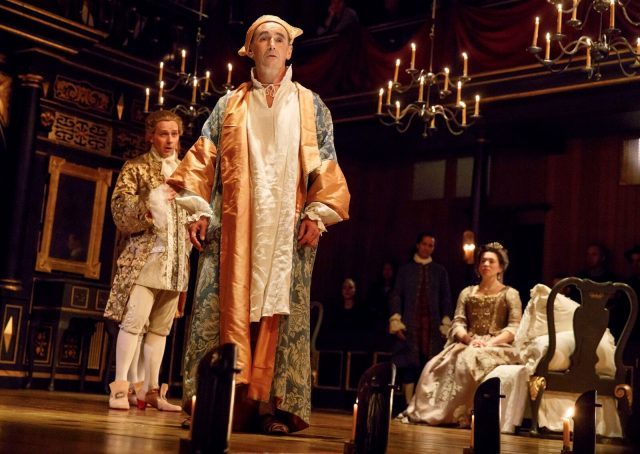
Lisa Howard, Alison Luff, Paul Alexander Nolan, and Eric Petersen get wasted away again in Margaritaville (photo © Matthew Murphy)
Marquis Theatre
210 West 46th St. at Broadway
Tuesday – Sunday through July 1, $59-$169
escapetomargaritavillemusical.com
Greg Garcia and Mike O’Malley do a phenomenal job adapting Jimmy Buffet’s songs into the rousing Escape to Margaritaville, which opened tonight at the Marquis Theatre. The television veterans and first-time book writers have created a show that was well on its way toward being one of the best new musicals on Broadway — until the last half hour or so rapidly devolved into saccharine, lowest-common-denominator fluff. But up till then, it’s a tasty buffet featuring a bright young cast, astute direction by Christopher Ashley, playful choreography by Kelly Devine, and a flurry of Easter eggs that will delight laid-back Parrotheads everywhere. The plot is about as basic as it comes. Tammy (Lisa Howard) is preparing to marry the doltish, beer-swilling, sports-obsessed Chadd (Ian Michael Stuart). The week before the wedding, Tammy and her best friend, Rachel (Alison Luff), jet off on a Caribbean bachelorette vacation. While Tammy is looking forward to partying and flirting, Rachel, an environmental scientist, is more interested in getting cell service and collecting soil samples from the top of a volcano. The adorable Rachel is immediately pounced on by the love-’em-and-leave-’em Tully Mars (Paul Alexander Nolan), a Buffett-like singer-songwriter and islander who is the primary entertainment at the not-quite-luxurious Margaritaville Hotel and Bar, where work is a dirty four-letter word. Tully’s best friend, Brick (Eric Petersen), is a clueless but lovable bartender who takes an instant liking to Tammy. The hotel is owned and operated by Marley (Rema Webb), with Jamal (Andre Ward) in charge of keeping the guests happy; both characters are colonialist leftovers that should have been more sensitively developed instead of merely being outdated stereotypes. While Rachel lets down her hard-shell exterior and warms up to Tully’s incessant advances, Tammy is having such a good time with Brick that she is reconsidering her situation with Chadd. But when the volcano threatens to explode, everybody is forced to reevaluate their lives and loves.
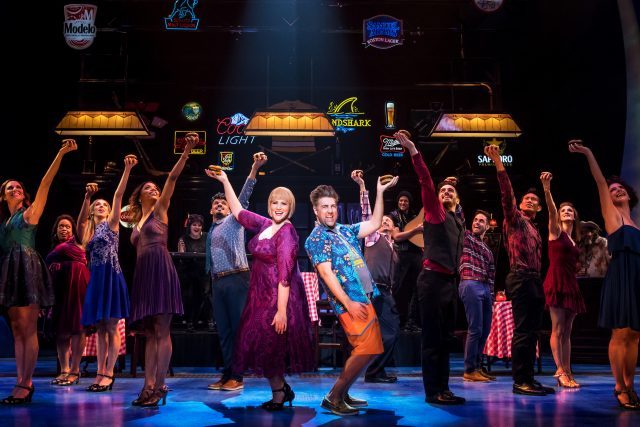
Tammy (Lisa Howard) and Brick (Eric Petersen) hit it off in island paradise (photo © Matthew Murphy)
Garcia (My Name Is Earl, Raising Hope) and O’Malley (Survivor’s Remorse, Shameless) have done their homework, creating a tight book that is filled with myriad minor details that later pop up in the songs; Buffett fans might get an inkling of what’s to come, but even newbies will get a kick out of how it all comes full circle. For example, J.D. (Don Sparks), an older, one-eyed drunken pilot, is constantly misplacing the salt. When the company performs Buffett’s most famous tune, “Margaritaville,” J.D. takes the microphone when it comes time for the favorite line “Searchin’ for my lost shaker of salt.” Similarly, the diet that Chadd puts Tammy on, consisting of only carrot juice and sunflower seeds, is taken from “Cheeseburger in Paradise.” And if you’re wondering why Tammy and Rachel are from Cincinnati, just listen closely to the beginning of “Fins.” The show gets just about everything right, including inventive uses of wires to show characters snorkeling, until the last handful of scenes, when it degenerates suddenly into treacly Broadway clichés, turning its back on the risky plot choices that came before; to have really shaken up the genre and been a creative whole, it actually could have ended at intermission, or at least about halfway through the second act, and avoid the approaching shipwreck. Alas, the rest was so dreadful that I almost wanted to make my escape from Margaritaville, but I stuck it out.
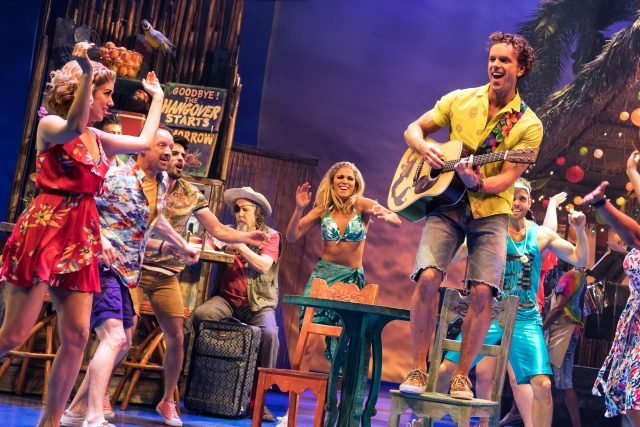
Tully Mars (Paul Alexander Nolan) keeps ’em dancing and singing at the Margaritaville Hotel (photo © Matthew Murphy)
The music, of course, is a helluva lot of fun. For the most part, Michael Utley’s orchestrations remain faithful to Buffett’s originals, only occasionally going over the top and becoming Broadway-fied; Buffett was involved in the song selection and tweaked some tunes for the show in addition to writing “Three Chords” for Tully and Rachel. Walt Spangler’s hotel set makes you feel like you’re in the Caribbean, partying with the tourists. (Yes, there are margaritas available for purchase; at an early preview the theater reportedly ran out of Triple Sec because demand was so high.) Howard (It Shoulda Been You, The 25th Annual Putnam County Spelling Bee) has charm and energy to boot as Tammy, while Luff (Les Misérables, Matilda) is smart and sexy as Rachel. Petersen (School of Rock, Elf) provides plenty of comic relief, but Nolan (Bright Star, Doctor Zhivago) is a bit too smarmy as Tully, even as his heart warms up to unexpected possibilities. It’s a shame that the ending is so banal, running out of creative risks the way the theater bar ran out of Triple Sec.

